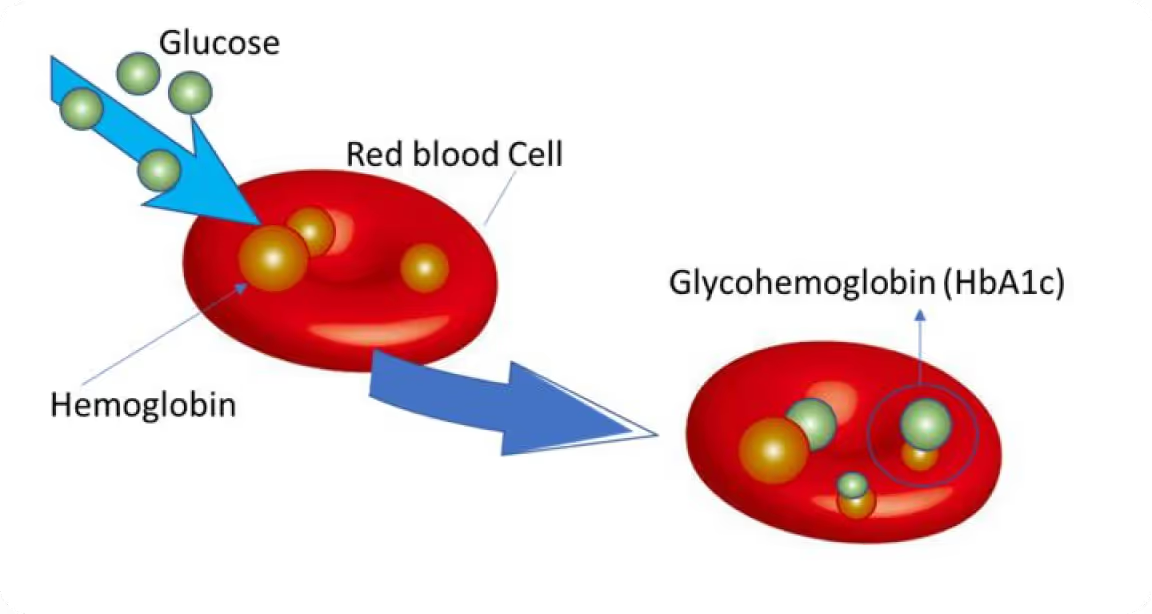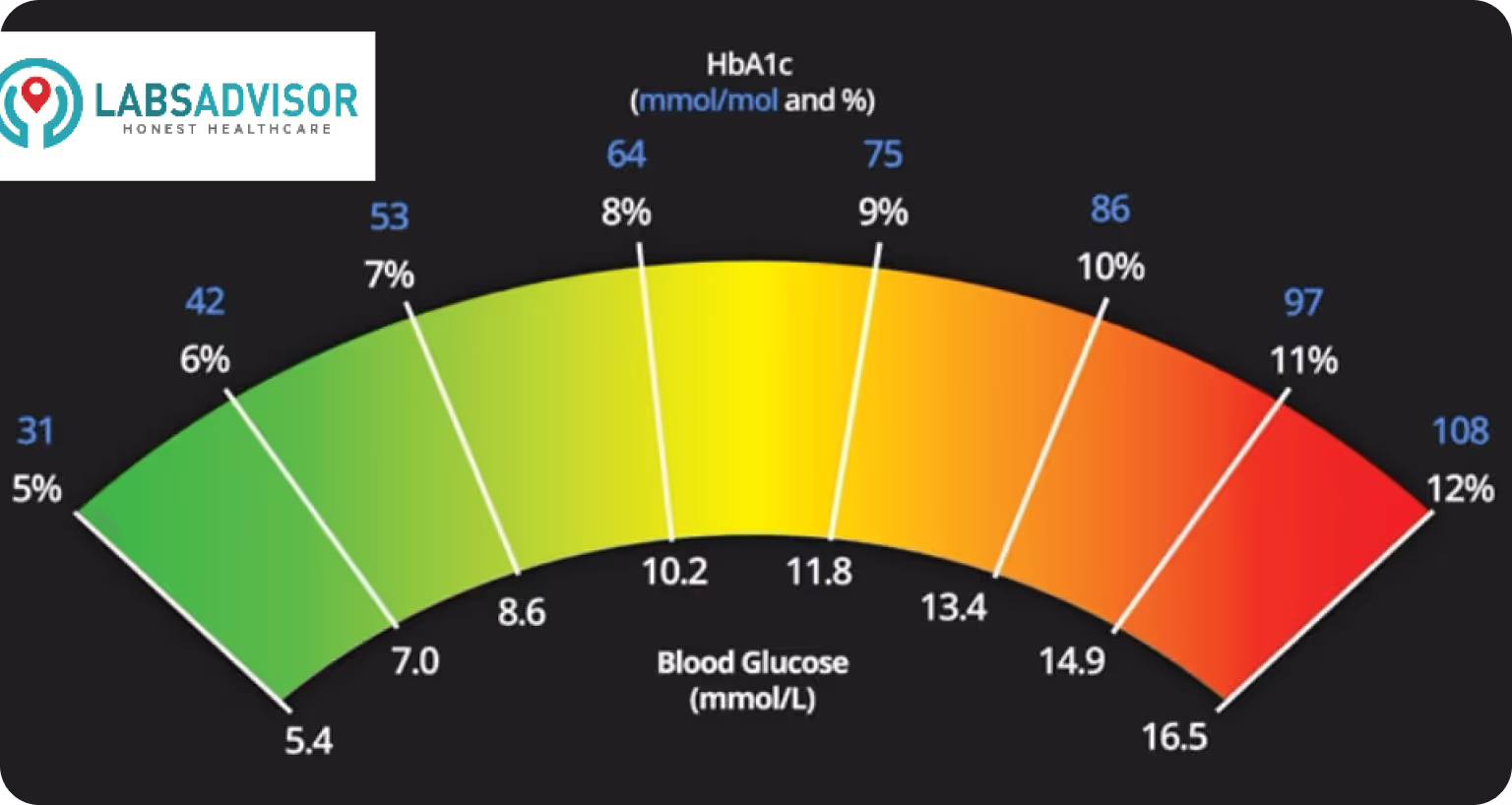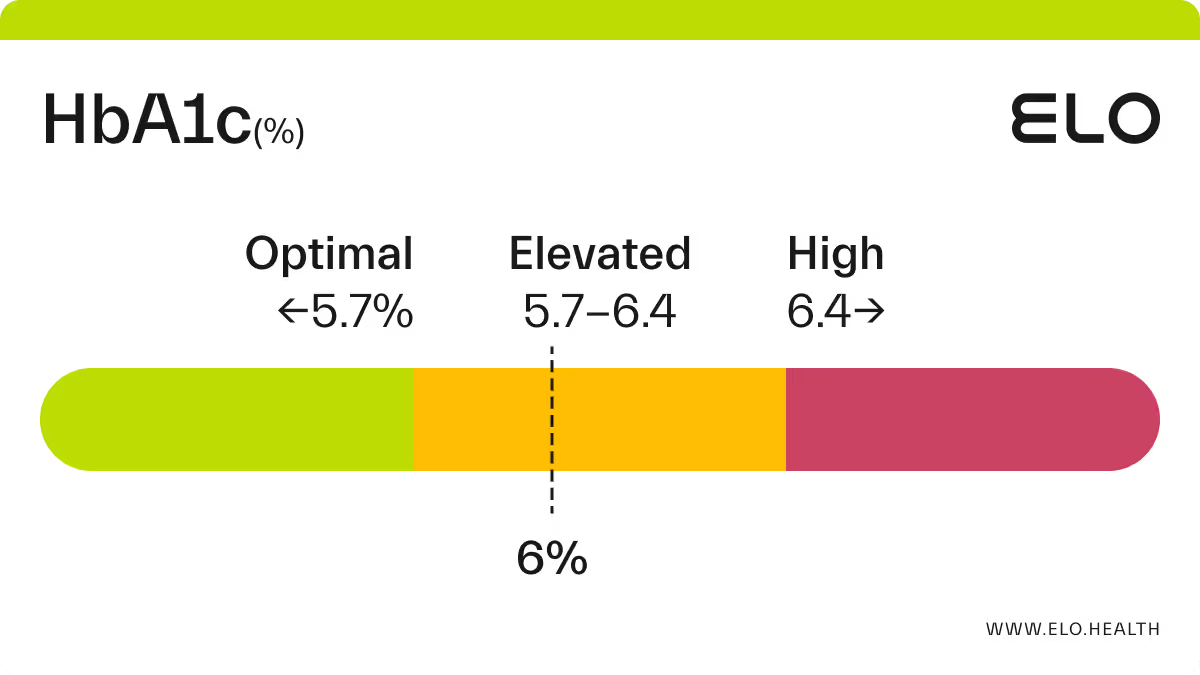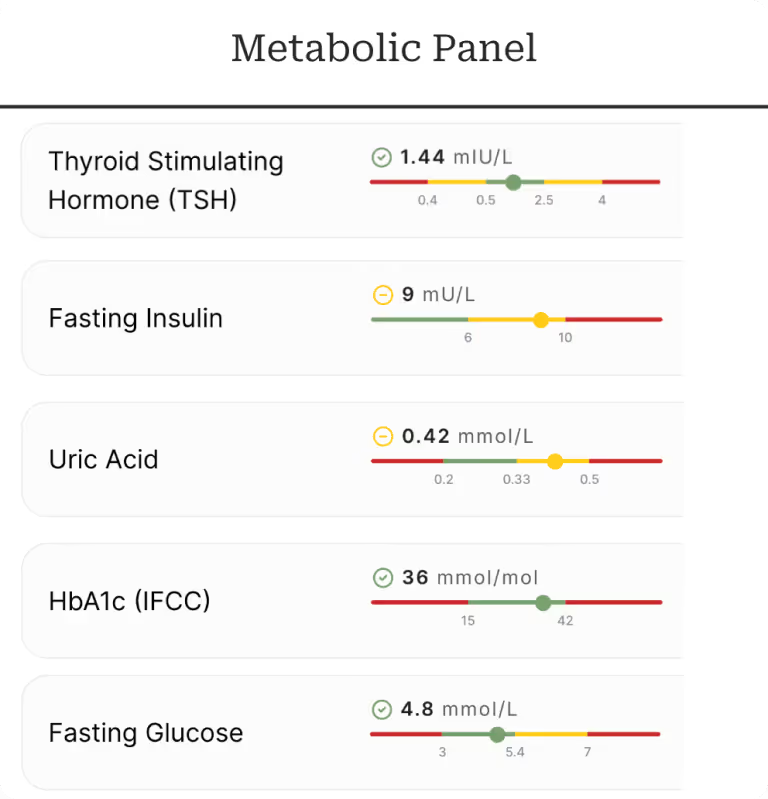HbA1c (Hemoglobin A1c)
The HbA1c test is a critical tool in understanding your long-term blood sugar levels, offering a more complete picture of your metabolic health. The American Diabetes Association (ADA) provides guidelines and recommendations for monitoring HbA1c levels, emphasizing the importance of regular testing for effective diabetes care. At Everlab, we provide comprehensive HbA1c testing as part of our preventive health services to help you stay on top of your health, identify early risks, and make informed decisions about your wellbeing.

Glycated Hemoglobin (HbA1C): An important test for metabolic health
What:
Blood biomarker
Tests for:
Diabetes and blood glucose levels
Referral:
Required
Member cost:
Part of larger blood test

What is HbA1c and Why Does It Matter?
What is HbA1c and how is it measured?
HbA1c, also known as glycated haemoglobin, is a marker used to measure your average blood sugar levels over the past two to three months. Haemoglobin, the protein in your red blood cells that carries oxygen, naturally bonds with glucose (sugar) in your bloodstream. Red blood cells live for approximately 120 days, which is why the HbA1c test reflects blood sugar control over the past few months. The HbA1c test measures how much of this bonding has occurred. During the test, a small blood sample is taken and analysed.
Why is HbA1c important for assessing long-term blood sugar control?
Unlike regular glucose tests, which only measure blood sugar at a specific moment, the HbA1c test gives you a longer-term view. The HbA1c test reflects your average glucose level over the past two to three months. This is critical because it helps you understand how well your body is managing sugar over time, not just after a meal or during a fasting state. It is especially useful for people at risk of or managing diabetes, as it helps identify trends in blood sugar control.
How does HbA1c differ from a regular blood glucose test?
The main difference between HbA1c and a regular blood glucose test is the timeframe they measure. A regular blood glucose test measures your blood glucose level at a specific moment, providing a snapshot of your blood sugar levels at a single point in time, whereas HbA1c reflects your average levels over the past two to three months. This makes HbA1c particularly valuable for tracking long-term trends. Everlab recommends combining both tests for a more comprehensive understanding of your glucose control.
What role does HbA1c play in managing diabetes?
HbA1c is a key metric for diagnosing and managing diabetes. It plays a crucial role in comprehensive diabetes management by helping to individualise treatment goals and optimise glycaemic control. For individuals with diabetes, maintaining optimal HbA1c levels is essential for reducing the risk of complications such as nerve damage, kidney disease, and vision problems. Healthcare providers often use HbA1c to adjust treatment plans, whether that involves changes in medication, diet, or lifestyle.
Can HbA1c provide insights into your overall health?
Yes, HbA1c can offer valuable insights beyond blood sugar control. Elevated HbA1c levels can indicate a higher risk of developing diabetes complications. Since it reflects glucose metabolism, it indirectly relates to various metabolic and cardiovascular health markers. Elevated HbA1c levels can signal issues like insulin resistance, inflammation, and oxidative stress—all of which are associated with a higher risk of heart disease, stroke, and even cognitive decline.
Preparing for an HbA1C Test
How to prepare for an accurate HbA1c test?
Preparing for an HbA1c test is straightforward and doesn’t require fasting, unlike many other blood tests. You can eat and drink normally before the test, making it convenient for most people. However, there are a few important considerations to ensure your results are accurate.
What factors should you consider before taking the test?
Firstly, if you are taking iron supplements, it’s crucial to inform your healthcare provider. Iron supplements can interfere with the accuracy of the HbA1c test results. Additionally, certain medications, such as those for diabetes, high blood pressure, or kidney disease, can also affect the test outcomes. Make sure to discuss all medications you are taking with your doctor.
If you have had a blood transfusion in the past three months, this can also impact the accuracy of your HbA1c results. Inform your healthcare provider about any recent transfusions. Lastly, choose a reliable laboratory for your test. Ensure the lab is certified and follows standard procedures to guarantee accurate results.
By considering these factors, you can ensure that your HbA1c test results are both accurate and reliable, providing a true reflection of your long-term blood glucose levels.
Understanding your HbA1c results

What is NGSP or IFCC HbA1c?
NGSP (National Glyco-haemoglobin Standardisation Program) and IFCC (International Federation of Clinical Chemistry and Laboratory Medicine) are two different standardisation methods used to report HbA1c levels. They are the same test, but display in different units. HbA1c IFCC is measured in mmol/mol, and NGSP is displayed as a percentage.
What is a normal HbA1c range for adults?
For most adults, a normal HbA1c level is below 5.7%. If your HbA1c falls within this range, it generally means your blood sugar levels have been well-regulated. However, individual targets may vary based on factors such as age, existing medical conditions, and lifestyle choices. At Everlab, any number above 42mmol/mol or 5.6% is considered suboptimal and can indicate either pre-diabetes or diabetes.
What HbA1c levels indicate prediabetes or diabetes?
An HbA1c level between 5.7% and 6.4% indicates prediabetes, a state where your blood sugar is higher than normal but not yet in the diabetes range. The HbA1c test is a critical tool to diagnose diabetes, as it measures average blood glucose levels over the past three months. An HbA1c of 6.5% or higher usually indicates diabetes. Identifying elevated HbA1c levels early is key to preventing the progression to type 2 diabetes, and it’s why regular testing is important for those at risk.
Can your HbA1c level fluctuate over time?
Yes, HbA1c levels can fluctuate depending on various factors, including changes in diet, physical activity, stress levels, and illness. This is why regular monitoring is essential to understanding how your lifestyle impacts your blood sugar levels. At Everlab, we recommend getting your HbA1c tested every six months, especially if you’re working on improving your metabolic health.

Factors Affecting HbA1C Results
Several factors can influence the accuracy of your HbA1c test results, making it essential to be aware of them before undergoing the test.
One significant factor is the lifespan of your red blood cells. Since the HbA1c test measures your average blood glucose levels over the past two to three months, any condition that affects red blood cell lifespan, such as anemia or kidney disease, can lead to inaccurate results.
Your current blood glucose levels also play a role. If you have unusually high or low blood glucose levels at the time of the test, it can skew the results. Medications, particularly those used to treat diabetes, high blood pressure, or kidney disease, can also impact the accuracy of the HbA1c test. Always inform your healthcare provider about any medications you are taking.
Blood transfusions can significantly affect HbA1c results. If you have received a transfusion in the past three months, make sure to inform your doctor. Pregnancy is another factor that can alter blood glucose levels and, consequently, HbA1c results. Similarly, conditions like kidney and liver disease can affect the accuracy of the test.
By being aware of these factors and discussing them with your healthcare provider, you can ensure that your HbA1c test results are as accurate as possible, providing a reliable measure of your long-term blood glucose control.
How HbA1c Relates to Long-Term Health
How can high HbA1c levels impact your health over time?
Chronic high HbA1c levels indicate prolonged periods of elevated blood sugar, which can damage blood vessels and organs. Diabetes mellitus, characterized by high HbA1c levels, can lead to severe complications if not properly managed. Over time, this can increase your risk for complications such as heart disease, stroke, kidney failure, and nerve damage.
What are the risks of maintaining an elevated HbA1c level?
Persistently high HbA1c can lead to serious health issues. The longer your HbA1c remains elevated, the greater your risk of complications like vision loss, cardiovascular problems, and even limb amputations due to poor blood circulation.
Can lowering your HbA1c reduce the risk of heart disease and stroke?
Studies have shown that reducing HbA1c levels can significantly lower the risk of cardiovascular events, particularly in people with diabetes. Even a small reduction in HbA1c can have a profound impact on your heart health.
How does HbA1c relate to other markers of metabolic health?
HbA1c is closely linked to other metabolic health indicators, such as cholesterol levels, blood pressure, and body mass index (BMI). At Everlab, we combine HbA1c testing with other metabolic markers to provide a more comprehensive assessment of your overall health.
How can I improve my HbA1c?

What lifestyle changes can help lower HbA1c levels?
Making changes to your diet, increasing physical activity, and managing stress can all help lower your HbA1c levels. These lifestyle changes are particularly impactful for managing insulin dependent diabetes mellitus, as they can complement intensive treatment strategies to slow the progression of complications. A healthy diet rich in whole foods, regular exercise, and sufficient sleep are essential components of a healthy lifestyle that can improve your blood sugar control.
How does diet impact HbA1c and blood sugar control?
A diet high in refined carbs and sugars can spike your blood sugar and increase your HbA1c over time. Tests like the oral glucose tolerance test (OGTT) can also show elevated glucose levels due to such dietary habits. Conversely, a balanced diet rich in fibre, lean proteins, and healthy fats can stabilise blood sugar levels and improve your HbA1c.
Can regular exercise improve your HbA1c?
Yes, regular exercise helps improve insulin sensitivity, allowing your body to use glucose more effectively and reducing your HbA1c levels. Both aerobic exercises, like walking or cycling, and strength training can have beneficial effects. Something as simple as a 30 minute walk after meals can help reduce your blood glucose spikes and improve your HbA1c levels.
How does weight management play a role in controlling HbA1c?
Maintaining a healthy weight is key to controlling your HbA1c. Excess weight, particularly around the abdomen, can lead to insulin resistance, making it harder for your body to manage blood sugar. By focusing on weight management, you can improve your HbA1c and overall metabolic health.
What role does sleep and stress management have in HbA1c levels?
Poor sleep and chronic stress can both elevate blood sugar and HbA1c levels. Implementing strategies to improve sleep quality and manage stress, such as mindfulness or meditation, can support better blood sugar control.
The best way to treat diabetes is to not let it get to you at all.
The HbA1c test measures your average blood sugar levels over the past two to three months, providing valuable insights into your long-term glucose control. It’s a vital tool for diagnosing and managing diabetes, as well as assessing overall metabolic health. The A1c test is crucial for defining different A1c level ranges for normal, prediabetic, and diabetic classifications. By regularly monitoring your HbA1c, you can detect early signs of insulin resistance, reduce your risk of chronic diseases, and improve your overall health through lifestyle changes. Everlab offers this test alongside many others to provide a holistic view of your health.



imaging

biomarkers

sterols
Book a Free Discovery Call
Join 20,000+ Australians improving their health with proactive, personalised healthcare.